TensorFlow Alternatives
TensorFlow
Free
AI Development Tools
TensorFlow is an open-source machine learning framework developed by Google, designed to help developers and data scientists build and deploy models effectively. It supports various tasks, such as deep learning, data analysis, and even reinforcement learning. Users can tackle projects like image recognition, natural language processing, and predictive analytics with ease. TensorFlow boasts a flexible architecture, allowing for efficient scaling of machine learning models in production environments. Its rich ecosystem includes tools like TensorFlow Lite for mobile applications and TensorFlow.js for JavaScript developers, expanding its versatility.Key features include an extensive library of pre-trained models and seamless integration with popular development environments. While it offers powerful capabilities, TensorFlow can be complex for beginners, with a steep learning curve and high resource requirements. Its massive community provides a wealth of resources, making troubleshooting and learning accessible. For those seeking alternatives, platforms like PyTorch and Keras offer different approaches to machine learning, focusing on user-friendliness and ease of implementation. Exploring these options can help you find the best fit for your AI projects.
List of TensorFlow Alternatives

Numind AI
Free
AI Development Tools
NuMind is an innovative platform that enables users to develop custom natural language processing models tailored to their unique needs. By utilizing advanced language models and an interactive AI development approach, NuMind simplifies tasks like sentiment analysis, topic detection, and chatbot creation. This tool is designed for both businesses and individual users, allowing for quick deployment of machine learning models without requiring extensive technical skills.
One standout feature of NuMind is its intuitive interface, which makes complex model development accessible to everyone. The platform also offers multilingual support, ensuring it meets the needs of diverse users. Real-time performance tracking and flexible deployment options further enhance its usability, making it suitable for various industries.
NuMind operates on a subscription-based pricing model, providing users with comprehensive access to its features. A free trial is available, allowing potential users to evaluate its capabilities. If you are considering NuMind, exploring alternatives could lead you to discover other tools that might better fit your specific needs and budget.

Heimdallapp Org
Free
AI Development Tools
Heimdall is a cloud-based application designed to streamline machine learning processes, making them accessible for users without extensive data science backgrounds. This tool automates data analysis and model building, providing production-ready APIs for easy integration into existing applications. It is particularly beneficial for startups, enterprises, developers, and data analysts looking to harness machine learning capabilities without deep technical expertise.
One of Heimdall's key features is its user-friendly interface, which simplifies complex tasks. The platform also supports real-time monitoring and secure data handling, ensuring that users can manage their projects effectively. Its cloud-based nature allows for scalable solutions, making it suitable for businesses of all sizes.
While Heimdall operates on a subscription-based pricing model, it offers a free trial for users to explore its features before committing. This flexibility makes it an attractive option for those considering machine learning tools. If you are evaluating Heimdall, exploring alternatives may reveal additional functionalities or pricing options that align better with your specific requirements.

Mistral AI
Free
AI Development Tools
Mistral AI is an innovative platform focused on providing open-source large language models. Founded in 2023 by experts from Google DeepMind and Meta, it emphasizes European data sovereignty. This makes it an ideal choice for developers, businesses, researchers, and educators seeking reliable AI solutions.
One of Mistral AI's standout features is its user-friendly interface, which simplifies the integration of advanced language models. Users can access high-quality outputs and enjoy cross-platform compatibility, ensuring seamless use across devices. The tool is free to use, with premium options available for those needing additional features.
Mistral AI's commitment to transparency and collaboration through open-source models sets it apart in the competitive AI landscape. However, potential users should note that its focus on European languages may limit global applicability. Additionally, some advanced models require significant computational resources for optimal performance.
If you are considering Mistral AI, it may be beneficial to explore alternatives that offer different features or pricing structures. Finding the right AI tool can greatly enhance your projects and initiatives.

Firstmate Io
Free
AI Development Tools
FirstMate is an advanced AI tool designed to streamline complex codebases, making it easier for teams to implement changes efficiently. It is particularly beneficial for development teams, product managers, startups, and large enterprises. By mapping code into functional domains, FirstMate allows developers to concentrate on intricate tasks while enabling non-technical team members to make minor adjustments independently.
Key features include automated code mapping, real-time updates, and integration with major repositories like GitHub and Azure DevOps. Its user-friendly interface enhances collaboration and productivity, making it accessible for all team members. FirstMate's scalable architecture supports growing organizations, ensuring that code management remains efficient as teams expand.
Operating on a subscription-based model, FirstMate offers a free trial for users to explore its capabilities before committing. Pricing plans start at $99 per month for advanced features. While FirstMate is a powerful solution for codebase management, considering alternatives may help you find a tool that aligns even more closely with your specific needs and workflow preferences.

Runcell Dev
Free
AI Development Tools
Runcell is an innovative AI assistant tailored for Jupyter notebooks, designed to streamline data analysis by automating code generation, execution, and debugging. This tool is perfect for data scientists, researchers, educators, and developers who want to enhance their productivity and efficiency in data-driven tasks. With Runcell, users can expect a significant acceleration in their workflows, allowing them to focus on insights rather than repetitive coding.
Key features include interactive learning modes, autonomous agent capabilities, and context-aware code suggestions. The intuitive interface makes it accessible for users at all skill levels. Runcell seamlessly integrates with JupyterLab, Classic Notebook, and VS Code, ensuring a smooth user experience.
While Runcell offers a free plan with limited credits, its Pro and Pro+ plans provide access to advanced models and additional features. Although Runcell excels in many areas, users may want to explore alternatives that could better suit their specific needs or budget. Considering other options can lead to discovering tools that align more closely with your data analysis requirements.

Jsondataai
Free
AI Development Tools
JSON Data AI is an innovative platform that transforms natural language prompts into structured JSON data and API endpoints. It is ideal for software developers, backend engineers, and data professionals who need efficient data management solutions. Users can easily define data structures using simple language, making the tool accessible to both technical and non-technical users.
One of its standout features is the ability to generate API endpoints directly from JSON data, streamlining the development process. The platform offers both free and premium plans, with the premium version providing advanced AI models, unlimited endpoint generation, and higher request limits. This flexibility allows users to choose a plan that fits their needs.
The user-friendly interface enhances the overall experience, making it easy to navigate and utilize the tool effectively. While JSON Data AI excels in its offerings, users may want to explore alternatives that could provide different features or pricing structures. Considering other options can help you find the best fit for your data generation and API creation needs.

Pluginport Io
Paid Plan - Custom
AI Development Tools
Plugin Port is an innovative AI development firm focused on creating modern applications that harness the power of advanced AI technologies. This platform specializes in mobile and web app development, as well as custom GPT creation, making it a great fit for startups, enterprises, and entrepreneurs alike. With a commitment to delivering tailored solutions, Plugin Port aims to drive business growth through innovative applications.
What distinguishes Plugin Port is its comprehensive service offering, which includes full-stack development, app design, and ongoing maintenance. This ensures that clients receive a seamless experience from concept to deployment. The user-friendly interface allows even those with limited technical expertise to engage effectively with the platform.
While Plugin Port does not offer a free plan, its custom pricing is designed to meet the unique needs of each client. Starting prices for services vary, providing flexibility for different budgets. If you are exploring alternatives, consider looking into other development firms that might better suit your specific project requirements and financial considerations. Finding the right fit can significantly enhance your app development journey.

Tryterracotta
Free
AI Development Tools
Terracotta is an innovative AI tool designed to optimize Terraform workflows by providing instant, context-aware reviews and summaries for pull requests. It integrates smoothly with GitHub, delivering real-time feedback and actionable insights that enhance the quality and security of infrastructure code. This makes it an ideal choice for DevOps engineers, infrastructure developers, security analysts, and open-source contributors who want to streamline their code review processes.
What distinguishes Terracotta is its advanced AI technology, which offers features like instant Terraform plan execution and real-time drift detection. Users benefit from contextual feedback on code changes, ensuring that potential security risks are identified promptly. The user-friendly interface makes navigation intuitive, allowing teams to focus on their projects without unnecessary complexity.
Terracotta offers a free plan that provides access to its essential features, making it accessible for individuals and small teams. For those looking for more advanced capabilities, paid plans are available. If you are exploring options, consider other tools that may better fit your specific needs and enhance your Terraform workflow.

Dosu Dev
Free
AI Development Tools
Dosu is an innovative AI-powered assistant designed to streamline software development by automating issue responses, bug triage, and documentation updates. It integrates seamlessly with platforms like GitHub, making it an ideal choice for software development teams looking to enhance productivity and improve workflow efficiency. Dosu is particularly beneficial for project managers, quality assurance professionals, and tech startups that need scalable solutions for managing codebases.
What makes Dosu stand out is its user-friendly interface and advanced AI technology. Key features include automated issue responses, bug prioritization, and dynamic documentation updates. These capabilities not only save time but also ensure that teams can focus on more complex tasks. Dosu offers a free tier, with paid plans starting at $19 per month, allowing users to access additional features and support.
While Dosu excels in automating development workflows, it is primarily compatible with GitHub and Slack. If you are considering tools for software development, exploring alternatives may help you find solutions that better fit your specific needs and enhance your overall productivity.

Gitbrain Dev
Free
AI Development Tools
GitBrain is a cutting-edge AI-driven Git client tailored for macOS users, designed to simplify version control tasks and boost developer productivity. This tool intelligently manages Git operations, allowing developers to concentrate on coding rather than navigating complex Git commands. It is especially beneficial for those new to version control, as well as seasoned developers looking to streamline their workflows.
What sets GitBrain apart is its intuitive interface and advanced AI capabilities. Key features include intelligent commit generation, interactive commit editing, and AI-powered change summaries. These functionalities not only enhance efficiency but also make Git management more accessible. GitBrain is currently available for free to beta users, providing an excellent opportunity to explore its features without any financial commitment.
While GitBrain excels in simplifying Git tasks, it is limited to macOS and may not support all advanced Git operations. If you are exploring Git management tools, considering alternatives could help you find options that better align with your specific requirements. Exploring different tools can significantly enhance your development experience.

Gitfluence
Free
AI Development Tools
GitFluence is an innovative AI tool designed to streamline the process of finding Git commands. By simply describing your task in natural language, it generates the appropriate command, making it an invaluable resource for developers of all skill levels. This tool is particularly beneficial for beginners who are learning Git, as well as experienced developers seeking to enhance their efficiency.
What distinguishes GitFluence is its user-friendly interface and advanced AI technology. Key features include instant command suggestions, a copy-and-paste function, and web-based accessibility. These features save time and simplify the learning curve, allowing users to focus on their projects rather than struggling with command syntax. GitFluence is completely free, providing essential functionalities without any cost.
While GitFluence excels in Git command assistance, it may not cover all advanced scenarios or specialized operations. If you are considering tools for Git command support, exploring alternatives could reveal options that better suit your specific needs or preferences. Discovering different tools might enhance your overall development experience.

Dreamlab Gg
Free
AI Development Tools
Dreamlab is a versatile, open-source game engine tailored for creating engaging multiplayer experiences. This browser-based platform simplifies game development with its collaborative editor, built-in AI assistance, and easy deployment options. Developers can efficiently design, test, and share their games without the hassle of complex backend setups.
Ideal for indie developers, game jam participants, and community managers, Dreamlab fosters creativity and teamwork. Its intuitive interface makes it accessible for users of all skill levels. Key features include real-time collaboration, integrated multiplayer networking, and free server hosting, which streamline the development process. The platform also supports Discord integration, enhancing community engagement.
Dreamlab offers a free plan that includes essential tools for beginners, while the Pro Plan at $20 per month unlocks advanced features like unlimited AI code generation. Although it focuses on 2D game development, users may find the upcoming 3D support appealing. As you explore Dreamlab for your projects, consider looking into alternatives that might better suit your specific game development goals and preferences.

Ludo AI
Free
AI Development Tools
Ludo AI is an innovative game development platform designed to empower developers in creating unique games efficiently. It leverages artificial intelligence to generate game concepts, create assets, and analyze market trends. This tool simplifies the ideation process, allowing for quicker and more effective game development.
Ludo AI is perfect for indie developers, large studios, educators, and freelance artists. Its user-friendly interface makes it accessible for all skill levels. Key features include AI-powered game ideation, comprehensive market analysis tools, and seamless integration with Unity. The platform also supports collaborative features, enabling teams to work together effortlessly.
Ludo AI offers a free plan that allows users to explore basic functionalities, while the Pro Plan at $29.99 per month unlocks advanced features. Although some users may find the learning curve steep for certain tools, the benefits of accelerated game creation are significant. As you consider Ludo AI for your projects, it may be worthwhile to explore alternatives that could better align with your specific game development needs and preferences.
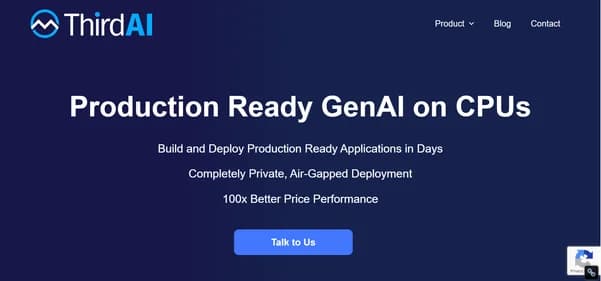
Thirdai
Paid Plan - from $$350
AI Development Tools
ThirdAI is an innovative AI platform that focuses on making artificial intelligence accessible and efficient for various users. It is particularly beneficial for enterprises, developers, startups, and researchers seeking cost-effective AI solutions. ThirdAI stands out by enabling deep learning training and inference on standard CPUs, eliminating the need for expensive GPUs. This democratizes AI, allowing a wider range of organizations to harness its power.
Key features include CPU-based deep learning, natural language processing support, and hyperparameter tuning tools. Users appreciate the platform's high performance and user-friendly interface, which simplifies complex tasks. ThirdAI also integrates seamlessly with popular frameworks like PyTorch and Hugging Face, enhancing its versatility.
While ThirdAI does not offer a free tier, its competitive pricing plans cater to different needs, making it a valuable option for many. However, exploring alternatives to ThirdAI may reveal other tools that align better with your specific goals and budget. Consider looking into various options to find the ideal AI solution that meets your unique requirements.

Codeaid IO
Free
AI Development Tools
Codeaid IO is an innovative AI-driven platform designed specifically for assessing developers during the hiring process. It simplifies recruitment by offering realistic coding challenges that accurately evaluate candidates' technical skills. This tool is ideal for recruiters, hiring managers, HR professionals, and tech companies seeking efficient and objective assessments.
One of Codeaid IO's standout features is its automated scoring system, which provides quick and detailed feedback on candidate performance. The platform also includes customizable assessments, allowing organizations to tailor challenges to their specific needs. With multi-tenant support, it can efficiently handle assessments for large teams.
Codeaid IO offers both free and paid plans, making it accessible for various budgets. The free plan includes essential features, while paid options unlock advanced reporting and enhanced support. Although it excels in many areas, some users may find limitations in integrations with certain applicant tracking systems. If you are considering Codeaid IO, exploring alternatives may help you discover tools that better align with your recruitment goals and preferences. Take the time to evaluate other options for your developer assessment needs.

Inferable AI
Free
AI Development Tools
Inferable AI is a powerful open-source platform designed for developers looking to integrate AI workflows into their existing applications. It provides essential features like AI guardrails, composability, and distributed orchestration, ensuring that automation is both reliable and scalable. This tool is perfect for developers, enterprises, data scientists, and startups seeking efficient AI workflow management.
One standout feature of Inferable AI is its end-to-end observability, which allows users to monitor and debug workflows seamlessly. The platform is developer-friendly, making it easy to implement within various codebases. Additionally, it supports on-premise execution, enhancing security and compliance.
As an open-source solution, Inferable AI is completely free to use, giving users full control over their data and infrastructure. While it excels in providing comprehensive AI automation, some users may find the learning curve steep or the integration process time-consuming. Exploring alternatives could lead you to tools that better fit your specific needs and preferences. Consider looking into other options to find the ideal solution for your AI workflow requirements.

Depshub
Free
AI Development Tools
DepsHub is an advanced AI-driven tool designed to simplify dependency management in software development projects. It caters to developers, project managers, DevOps engineers, and QA testers by automating the process of updating and managing dependencies across various programming languages, including JavaScript, Python, and Java. This versatility makes it an excellent choice for teams looking to enhance their workflow.
One standout feature is its automatic dependency updates, which save time and reduce manual errors. DepsHub also offers security vulnerability scanning and license compliance checks, ensuring that projects remain secure and legally compliant. Its user-friendly interface allows easy integration with existing development tools, making it accessible for teams of all sizes.
DepsHub provides a free plan for open-source projects, making it a cost-effective option for individual developers and small teams. However, paid plans are available for private repositories and additional features. If you are considering tools for dependency management, exploring alternatives to DepsHub could help you find a solution that better fits your specific needs.

Anycode AI
Free
AI Development Tools
Anycode AI is a cutting-edge platform designed to simplify software development through automation. It excels in tasks like code mapping, security vulnerability detection, and legacy code conversion. This tool is ideal for software engineers, DevOps teams, and security analysts who want to enhance productivity and code quality.
With its advanced AI technology, Anycode AI generates code from designs or text descriptions, making it a versatile choice for various programming languages. Users benefit from features like rapid security fixes and an intuitive interface that caters to both beginners and seasoned developers. The platform's freemium model allows users to access basic features for free, with paid plans available for advanced functionalities.
Anycode AI stands out for its comprehensive support and documentation, ensuring users can maximize its potential. While it offers many advantages, exploring alternatives could help you find tools that better suit your specific needs. Consider looking into other options to discover the best fit for your software development projects and enhance your workflow.

Retack AI
Free
AI Development Tools
Retack AI is a cutting-edge platform designed to monitor application errors in real-time, utilizing artificial intelligence to automatically resolve coding issues across multiple programming languages and frameworks. This tool is ideal for software developers, DevOps engineers, quality assurance teams, and project managers who seek to enhance application stability and efficiency. By automating error detection and resolution, Retack AI significantly reduces the time spent on debugging, allowing teams to focus on development.
Key features of Retack AI include real-time error monitoring, AI-driven code fixes, and comprehensive support for various environments. Its user-friendly interface simplifies navigation, while customizable monitoring settings allow users to tailor alerts to their specific needs. The platform also integrates seamlessly with Git, enhancing collaboration among team members.
Although Retack AI offers a free tier for small projects, larger teams may need to contact the company for detailed pricing. Users exploring alternatives may find other tools that better suit their specific requirements or budget. Considering different options can lead to discovering the perfect solution for your error monitoring needs.
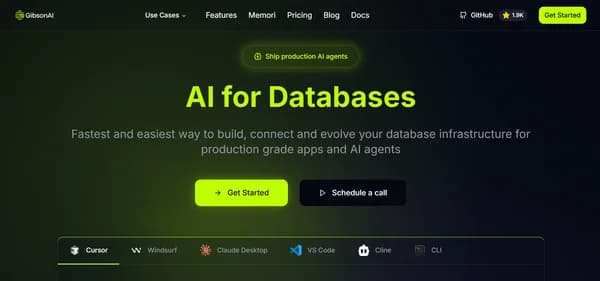
Gibsonai
Free
AI Development Tools
GibsonAI is a cutting-edge platform designed to streamline database design, deployment, and management through AI technology. It caters to developers, particularly backend and full-stack engineers, who want to simplify the complexities of serverless SQL databases. By utilizing natural language commands, GibsonAI automates tasks such as schema design, migrations, and API generation, allowing developers to focus on building applications rather than managing infrastructure.
The platform features an intuitive interface that enhances user experience, making it accessible for both novice and experienced developers. Key functionalities include automated API generation, seamless data migration, and autoscaling capabilities, which ensure that applications can grow without hassle. Additionally, GibsonAI supports popular database systems like PostgreSQL and MySQL, making it versatile for various projects.
What distinguishes GibsonAI is its ability to integrate AI-driven solutions into everyday database tasks, significantly improving efficiency. While it offers a robust free plan, users may want to explore alternatives that provide different features or pricing structures to find the best fit for their needs. Consider looking into other options to see what might work better for you.

Aboard
Paid Plan - Custom
AI Development Tools
Aboard is an AI-driven platform that simplifies the creation of custom business software. By allowing users to input specific requirements, Aboard generates tailored applications in minutes, significantly speeding up the development process. This tool is ideal for business owners, project managers, and developers seeking efficient software solutions across various sectors like operations, sales, HR, and finance.
Key features include AI-powered development, rapid app blueprinting, and expert collaboration, ensuring that users receive high-quality, customizable solutions. The user-friendly interface makes it accessible for individuals with varying levels of technical expertise. Aboard also supports API integration, allowing seamless connections with existing systems.
While Aboard does not offer a free plan, interested users can contact their team for a customized quote based on project complexity. This may be a consideration for smaller businesses looking for budget-friendly options. If you are interested in Aboard, it is worth exploring alternative tools that may better suit your specific needs or financial constraints.

Stepsize
Free
AI Development Tools
Stepsize AI is an innovative tool designed to help developers efficiently track, manage, and resolve code issues. By integrating seamlessly into existing development workflows, it provides contextual insights that simplify the bug identification and fixing process. This tool is perfect for development teams, individual developers, and project managers who need clear visibility into technical debt and team progress.
One of Stepsize's standout features is its automatic detection of code issues, which saves time and reduces frustration. The platform also offers AI-powered suggestions that enhance debugging efficiency. Collaboration features allow team members to discuss issues in one centralized location, fostering better communication. Additionally, Stepsize visualizes issue history and progress, making it easier to manage ongoing projects.
While Stepsize offers a free plan suitable for individuals or small projects, larger teams may benefit from its paid plans starting at $29 per month. Although it excels in integration and user-friendliness, some users may seek alternatives that provide different features or pricing structures. Exploring other options could help you find the ideal solution for your development needs.

AIcssanimations
Free
AI Development Tools
AI CSS Animations is a powerful tool designed to simplify the creation of CSS animations for web developers and designers. By allowing users to input a description of their desired animation, the tool generates the corresponding CSS code, making the animation process quick and efficient. This is particularly beneficial for busy professionals who want to enhance their projects without spending excessive time on coding.
One of the key features of AI CSS Animations is its real-time preview capability, which allows users to see their animations in action as they create them. The tool also offers customizable parameters, ensuring that users can tailor animations to fit their specific needs. Its user-friendly interface makes it accessible for both beginners and experienced developers.
AI CSS Animations operates on a subscription basis, with plans starting at $19 per month and a free trial available for new users. While it excels in generating CSS animations, exploring alternatives may provide additional features or pricing structures that better suit your needs. Consider looking into other tools to find the perfect match for your animation projects.

Contractreader Io
Free
AI Development Tools
ContractReader.io is an innovative web-based tool designed to simplify the reading and analysis of Ethereum smart contracts on the Mainnet. It is tailored for blockchain developers, crypto enthusiasts, and security auditors who need efficient tools for smart contract management. With features like syntax highlighting, dark mode, and mobile support, it enhances the user experience significantly.
One standout feature is its integration of GPT-4 for advanced security reviews, ensuring that contracts are thoroughly vetted for safety. The platform also provides live on-chain values, allowing users to analyze real-time data effectively. Future updates promise to introduce audit tools and testnet compatibility, further expanding its utility.
While ContractReader.io offers a free plan with basic features, advanced functionalities are available through paid subscriptions. This pricing structure may lead some users to explore alternatives that offer different pricing models or additional features. Although ContractReader.io excels in its niche, considering other options could help you discover a tool that aligns better with your specific needs and budget.

Kamaraapp
Free
AI Development Tools
Kamara is an AI-driven development assistant designed to optimize GitHub workflows for developers and teams. By integrating seamlessly with existing processes, Kamara enhances code quality and fosters collaboration among team members. This tool is ideal for individual developers, small teams, and large organizations looking to streamline their coding practices.
Key features of Kamara include full-context intelligence, superhuman code reviews, and AI-implemented pull requests. These capabilities help maintain high standards in code quality while reducing the time spent on manual reviews. Kamara also offers living documentation and knowledge preservation, ensuring that project information remains current and accessible to all stakeholders.
With a free plan available for individual developers, Kamara allows users to explore its functionalities without any upfront costs. Paid plans range from $19 to $499 per month, catering to various team sizes and needs. While Kamara excels in enhancing GitHub workflows, it is beneficial to consider alternatives that may align better with your specific requirements. Exploring other options can help you find the ideal tool for your development projects.

Gitroll Io
Free
AI Development Tools
GitRoll is an innovative AI-powered platform that evaluates developer skills by analyzing GitHub repositories. It transforms coding activities into detailed, data-driven portfolios, making it easier for recruiters to assess candidates' technical abilities and collaboration patterns. This tool is particularly beneficial for recruiters, hiring managers, and developers who want to showcase their skills effectively.
Key features of GitRoll include comprehensive code analysis, real-time code quality assessments, and automated candidate evaluations. Users can create interactive developer portfolios that highlight their project contributions, ensuring a transparent hiring process. GitRoll stands out for its focus on merit-based evaluations, eliminating biases often found in traditional hiring methods.
The platform offers a free plan with limited credits, allowing users to explore its capabilities without financial commitment. Paid plans start at $69 per month, providing additional features and credits. While GitRoll is a powerful tool for skill assessment, it is wise to explore alternatives that may better suit your specific needs. Consider looking into other options to find the best solution for your hiring process.

Gitloop
Free
AI Development Tools
GitLoop is an innovative AI-driven tool designed to optimize software development by simplifying codebase navigation, debugging, and documentation. It caters to software developers, teams, project managers, and onboarding specialists, enhancing productivity and code quality. GitLoop features natural language search, enabling users to find code snippets effortlessly. Personalized AI agents provide context-aware assistance, making the coding process smoother.
Automated code reviews are another highlight, ensuring that code quality is maintained without manual oversight. Additionally, GitLoop generates documentation automatically, saving valuable time for developers. Its bug detection and codebase insights further empower teams to proactively address issues before they escalate.
The user-friendly interface makes it accessible for both novices and seasoned developers. GitLoop offers a free plan for small projects, while premium subscriptions start at $15 per month, providing advanced features and dedicated support. Although GitLoop is a robust choice, it is wise to explore alternatives that may better suit your specific needs and enhance your development workflow.

Gitdigest AI
Free
AI Development Tools
Git Digest is an innovative AI-driven tool designed to optimize codebase reporting for development teams. By automating code summaries, it replaces traditional daily standups, allowing teams to focus on what matters most—coding. This tool is perfect for development teams, project managers, and software engineers who want to enhance productivity and streamline communication.
One standout feature is its ability to generate AI-powered code summaries, which provide valuable insights into team progress. Additionally, Git Digest offers automated email digests and Slack notifications, ensuring everyone stays informed. Its user-friendly interface makes it accessible for all skill levels, from novice developers to seasoned professionals.
Git Digest integrates seamlessly with GitHub, making it an excellent choice for teams already using this platform. The pricing is competitive, with a free trial available to explore its features. After the trial, users can opt for a monthly subscription or a one-time payment for lifetime access. While Git Digest excels in automation, exploring alternatives may reveal tools that better suit your specific needs and preferences.

Secuarden
Free
AI Development Tools
Secuarden is a cutting-edge AI security tool specifically designed for GitHub repositories. It employs advanced Large Language Model technology to conduct thorough scans, identifying security vulnerabilities, hidden secrets, and injection risks in both source code and AI prompts. This makes it an essential resource for developers who work with AI-driven codebases.
Secuarden stands out with its real-time alerts and continuous learning capabilities, ensuring that your code remains secure as it evolves. The tool is user-friendly, making it accessible for development teams, DevSecOps professionals, startups, and enterprises. It prioritizes early-stage code security, helping to prevent potential breaches before they occur.
Offering a free tier with limited scans, Secuarden allows users to evaluate its effectiveness before committing to a paid plan. While it excels in GitHub integration, users may want to explore alternatives that cater to different platforms or provide additional features. By considering other options, you can find the best security solution tailored to your specific needs and enhance your overall development process.

Dryrun Security
Free
AI Development Tools
DryRun Security is an innovative AI-driven application security platform tailored for developers and security teams. It integrates smoothly into existing workflows, offering real-time analysis of code changes to identify vulnerabilities before they reach production. This tool is ideal for development teams, security professionals, and DevOps engineers who prioritize secure coding without disrupting their processes.
One of DryRun Security's standout features is its contextual security analysis, which minimizes false positives and provides actionable feedback directly within pull requests. The platform supports multiple programming languages and frameworks, making it versatile for various projects. Its natural language code policies simplify the creation and enforcement of security measures, enhancing team collaboration.
DryRun Security operates on a subscription-based model, with plans designed to meet diverse organizational needs. While it excels in many areas, potential users should consider exploring alternatives that might better fit their specific requirements. By evaluating other options, you can ensure you select the best tool to enhance your development and security practices effectively.
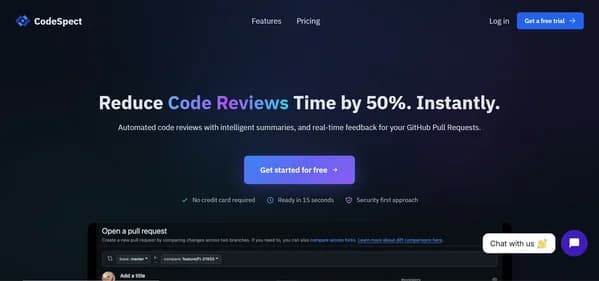
Codespect Io
Free
AI Development Tools
Codespect is a cutting-edge AI-powered code review tool tailored for development teams looking to enhance their GitHub pull request process. This tool is perfect for software engineers, open-source contributors, and startups aiming for efficient code quality management. Codespect automates code analysis, providing real-time feedback that identifies bugs, security vulnerabilities, and code inefficiencies. Its user-friendly interface ensures that both experienced developers and newcomers can navigate the platform with ease.
One standout feature is its ability to create custom analysis rules, allowing teams to tailor the tool to their specific coding standards. Additionally, Codespect supports collaboration among team members, making it easier to maintain high coding standards across projects. With a free trial offering 200,000 AI tokens, users can explore its capabilities without commitment.
While Codespect excels in many areas, it is wise to consider other options that might align better with your unique needs. Exploring alternatives can help you find the ideal tool that fits seamlessly into your development workflow.

Gitpack Co
Free
AI Development Tools
CodeWise is an innovative AI-driven tool designed to streamline code reviews for developers and teams. Ideal for software engineers, DevOps professionals, and project managers, CodeWise integrates effortlessly with GitHub and Bitbucket. It offers real-time analysis of pull requests, pinpointing issues like bugs, code smells, and security risks. By delivering contextual feedback and practical recommendations, CodeWise empowers developers to enhance code quality while saving valuable time.
A key feature is its intelligent feedback system, which adapts to the specific needs of your project. CodeWise also supports a variety of programming languages, making it versatile for diverse development environments. Its intuitive interface is designed for ease of use, accommodating both seasoned developers and newcomers alike.
CodeWise provides a free tier for open-source projects, allowing unlimited users and repositories. For additional features, paid plans are available. While CodeWise offers numerous advantages, it is beneficial to explore other tools that may better suit your requirements. Considering alternatives can lead you to the perfect fit for your coding workflow.

Corgea
Free
AI Development Tools
Corgea is an innovative AI-driven security platform designed to automate the detection and remediation of vulnerabilities in software code. Ideal for software development teams and security professionals, Corgea streamlines the process of securing applications. By integrating seamlessly with existing Static Application Security Testing tools, it identifies critical vulnerabilities like API security issues and broken authentication. The platform generates code fixes for developer approval, significantly reducing the time and effort needed to address security concerns.
One of Corgea's key features is its ability to support multiple programming languages and frameworks, making it versatile for various projects. With a low false positive rate, it minimizes alert fatigue, allowing developers to focus on critical issues. The intuitive interface enhances user experience, making it accessible for both seasoned professionals and newcomers.
While Corgea offers a free plan, advanced features require a paid subscription. If you are exploring options, consider looking into other tools that might provide different functionalities or pricing plans to better meet your security needs. Exploring alternatives can help you find the perfect fit for your development workflow.

Bloop AI
Paid Plan - Custom
AI Development Tools
Bloop AI is a cutting-edge tool designed to transform legacy COBOL code into modern, human-readable Java. This innovative solution is perfect for enterprises and development teams looking to modernize outdated systems. By enhancing code readability and maintainability, Bloop AI facilitates smoother integration with contemporary development practices.
One of its standout features is the ability to produce functionally equivalent Java code, ensuring that the original logic is preserved. The tool leverages advanced AI technology to deliver high-quality output, making it user-friendly and efficient. Bloop AI is particularly beneficial for financial institutions and government agencies that rely on legacy COBOL systems.
While Bloop AI offers custom pricing based on project scope, its focus on COBOL to Java conversions may not meet all legacy system needs. Users might find the initial setup complex and dependent on the AI's accuracy. Exploring alternatives could provide additional options that better suit your specific requirements. Consider looking into other tools that might offer broader language support or different pricing structures to enhance your modernization efforts.
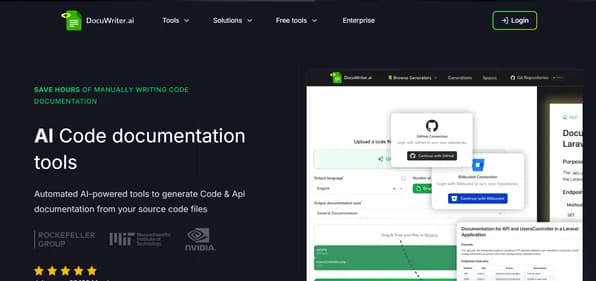
Docuwriter AI
Free
AI Development Tools
DocuWriter.ai is an innovative AI tool designed to automate code documentation, testing, and refactoring, making it an essential resource for developers and software teams. This platform is particularly useful for those looking to enhance code quality and streamline their development workflows. By automating tedious tasks, DocuWriter.ai allows users to focus on more critical aspects of their projects.
One of its key features is automated code documentation, which generates clear and concise documentation without manual effort. Additionally, it offers test suite generation and code refactoring capabilities, ensuring that your code remains maintainable and efficient. The tool supports multiple programming languages, making it versatile for various development environments.
DocuWriter.ai integrates seamlessly with popular tools like VS Code and Zapier, enhancing collaboration and productivity. While it offers a free trial, ongoing use requires a subscription starting at $29 per month. Users may want to consider exploring alternatives that provide different functionalities or pricing options. Investigating other tools can help you find the perfect fit for your development needs and improve your overall workflow.
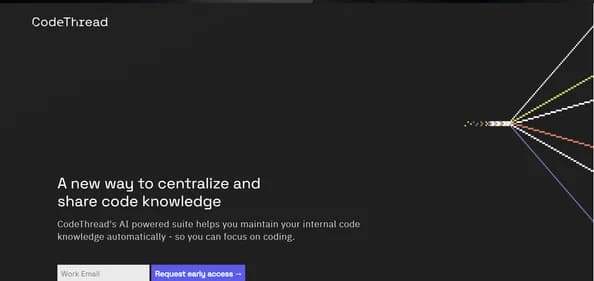
Codethread AI
Free
AI Development Tools
CodeThread AI is a cutting-edge tool designed to enhance code documentation and foster collaboration among software development teams. This platform is particularly beneficial for developers, project managers, and onboarding specialists who seek to streamline their workflows. By automating documentation processes, CodeThread AI saves valuable time and reduces the burden of manual updates.
One of its standout features is automated documentation creation, which allows teams to generate comprehensive documentation effortlessly. Additionally, the tool offers instant question routing, ensuring that team members receive timely answers to their queries. CodeThread AI also visualizes codebases, making it easier to understand project structures and track technical debt effectively.
With a freemium pricing model, CodeThread AI provides essential features for smaller teams while offering advanced functionalities for larger organizations. While it excels in code documentation, users may want to explore alternatives that provide different features or pricing structures. Considering other options can help you find tools that better suit your specific needs and enhance your development processes. Exploring alternatives could lead you to discover even more effective solutions for your projects.

Docwhizz
Free
AI Development Tools
DocWhizz is an AI-driven platform designed to transform how developers interact with API documentation. It aims to simplify understanding and implementing API products, making it a valuable tool for API developers, technical writers, and product managers. By embedding an AI assistant within documentation, DocWhizz enhances discoverability and accelerates integration processes.
One standout feature is its instant question-answering capability, which provides immediate responses to developer inquiries. This feature significantly reduces the time spent searching for information. Additionally, DocWhizz offers personalized integration examples, making it easier for developers to adopt APIs. Its plug-and-play setup ensures that integration with existing platforms is smooth and requires minimal technical expertise.
DocWhizz is available for free, allowing teams to enhance their documentation without financial barriers. While it excels in improving API documentation, users may want to explore alternatives that offer broader functionalities or different approaches. Considering other options can help you find tools that align more closely with your specific documentation needs and enhance your overall workflow. Exploring alternatives might lead you to discover even better solutions for your projects.
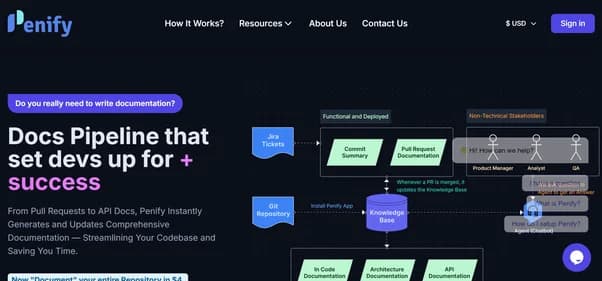
Penify Dev
Free
AI Development Tools
Penify.dev is an innovative tool designed to automate the generation and updating of documentation for Git repositories. This platform is ideal for software developers, project managers, and development teams looking to streamline their documentation processes. By reducing the time spent on manual tasks, Penify.dev allows users to focus more on coding and collaboration.
One of its key features is automated docstring generation, which simplifies the documentation of code changes. The tool integrates seamlessly with popular Git platforms like GitHub, GitLab, and Bitbucket, enhancing its usability. Additionally, Penify.dev supports multiple programming languages, making it versatile for various projects. Its user-friendly interface ensures that even those new to documentation can navigate it easily.
While Penify.dev offers a freemium model with essential features at no cost, users may want to explore alternatives that provide more advanced functionalities or tailored solutions. Considering other options can help you find tools that better meet your specific needs and enhance your documentation workflow. Exploring alternatives can lead to discovering solutions that fit your unique project requirements.
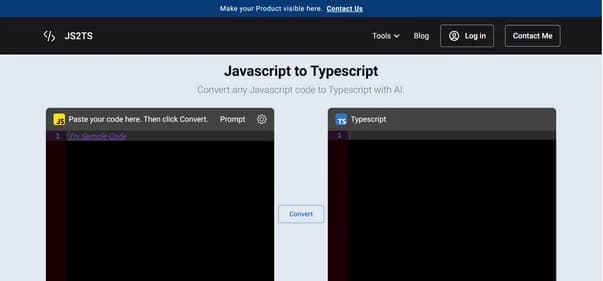
Js2Ts
Free
AI Development Tools
TypeScriptify is an innovative online tool designed to convert JavaScript code into TypeScript seamlessly. This platform is ideal for developers looking to enhance their projects with TypeScript's static typing and improved maintainability. Whether you are a seasoned programmer or a newcomer, TypeScriptify simplifies the transition to TypeScript.
One of its key features is the automated conversion process, which saves time and minimizes manual errors. The intuitive interface allows users to navigate effortlessly, making it accessible for all skill levels. TypeScriptify also supports large codebases, enabling efficient conversions for extensive JavaScript projects. Best of all, it is completely free to use, with no sign-up required.
While TypeScriptify excels in many areas, users might want to consider alternatives that offer advanced customization or integration with development environments. Exploring other tools can help you find options that better suit your specific coding needs. By looking into alternatives, you can enhance your development experience and discover solutions tailored to your workflow.

Snapmagic
Free
AI Development Tools
SnapMagic is a cutting-edge AI tool designed to revolutionize the electronics design process. It is tailored for electrical engineers, product designers, and manufacturing teams who seek to streamline circuit board design. By automating repetitive tasks and optimizing component selection, SnapMagic enhances productivity and fosters innovation. Its integration of real-time supply chain data ensures that users have the most current information at their fingertips.
One standout feature is its automated circuit completion, which significantly reduces design time. The platform also supports natural language interaction, making it accessible for users of all skill levels. With seamless compatibility with major EDA tools, SnapMagic fits effortlessly into existing workflows.
While SnapMagic operates on a subscription basis, it offers a free trial for users to explore its capabilities. Pricing plans start at $99 per month, catering to various user needs. Although SnapMagic excels in circuit board automation, users might want to consider alternatives that offer different features or pricing models. Exploring other options can help you find the best fit for your design needs and enhance your engineering projects effectively.

Cleeai
Paid Plan - Custom
AI Development Tools
CleeAI is a cutting-edge platform tailored for enterprises seeking to develop and implement AI solutions quickly. Designed for organizations in sectors like finance and consulting, CleeAI transforms straightforward business requirements into functional AI agents in mere minutes. This rapid deployment significantly reduces development time and costs, making it an attractive option for companies aiming to enhance operational efficiency.
One standout feature of CleeAI is its proprietary Large Knowledge Model technology, which ensures that AI outputs are both explainable and compliant with industry regulations. The user-friendly interface allows teams to adopt AI capabilities effortlessly, while scalable solutions cater to businesses of all sizes. CleeAI also emphasizes compliance-first design, making it ideal for organizations with strict regulatory standards.
While CleeAI does not offer a free plan, pricing is available upon request, tailored to specific enterprise needs. Although it excels in many areas, exploring alternatives could uncover other tools that align better with your unique requirements. Consider investigating various options to find the perfect fit for your organization’s AI journey.

Capture Dev
Free
AI Development Tools
Capture.dev is an AI-driven bug reporting tool designed to simplify the process of identifying and fixing issues in web applications. Perfect for developers, product managers, and quality assurance teams, it allows users to report bugs with just one click. This tool captures all necessary technical details automatically, making debugging more efficient and less time-consuming.
One of Capture.dev's standout features is its user-friendly interface, which enhances the overall experience. The tool also integrates seamlessly with popular project management platforms, ensuring smooth collaboration among team members. With AI-generated summaries, users can prioritize issues effectively, leading to quicker resolutions.
Capture.dev offers a 14-day free trial, allowing potential users to explore its features without commitment. After the trial, subscription plans start at $8 per month, catering to both individuals and teams. While Capture.dev excels in its functionality, those interested in exploring alternatives may find other tools that offer unique features or pricing options. Consider looking into different solutions to find the best fit for your bug reporting needs.

Browsingbee
Free
AI Development Tools
BrowsingBee is an innovative AI-driven platform designed for automated browser testing, making it perfect for QA engineers, developers, and product managers. This tool simplifies the creation and maintenance of tests by allowing users to generate robust, self-healing tests using natural language, eliminating the need for coding skills. With its ability to adapt to UI changes, BrowsingBee enhances the reliability of web application testing.
Key features include AI-powered test creation, proactive bug detection, and cross-browser support, ensuring consistent user experiences across various platforms. Users can also benefit from video recordings of test runs, which facilitate efficient debugging. The user-friendly interface makes it accessible for both technical and non-technical users.
BrowsingBee offers a free trial with 100 test runs, allowing users to explore its features without any upfront commitment. Subscription plans are available, but pricing details are provided upon request. While it excels in many areas, some users may find limitations in advanced features on lower-tier plans. If you are considering BrowsingBee, exploring alternative tools may help you find a better fit for your testing needs.

Xpolyglot App
Paid Plan - from $9.99
AI Development Tools
Xpolyglot is an innovative AI-driven localization tool specifically designed for developers working with Xcode projects. It simplifies the translation and management of app content, making it easier for developers to reach global audiences. By leveraging advanced AI technology, Xpolyglot streamlines the localization process, allowing for efficient updates and translations.
Key features include seamless integration with Xcode, delta updates that only translate modified strings, and global metadata management. This ensures that your app maintains a consistent presentation across different languages and regions. The user-friendly interface enhances the overall experience, making it accessible for both indie developers and small teams.
What makes Xpolyglot stand out is its one-time payment of $9.99, which covers lifetime updates, making it a cost-effective solution for localization. However, users must obtain a separate OpenAI API key for AI functionalities. While Xpolyglot is a strong choice for iOS developers, it is wise to consider other localization tools that may better fit your specific needs and budget. Exploring alternatives could lead to discovering the perfect solution for your app localization challenges.

Llmonitor
Free
AI Development Tools
LLMonitor is an innovative open-source observability toolkit tailored for AI developers seeking to enhance their applications' performance and reliability. This powerful tool enables users to log queries, monitor system performance, and evaluate AI models effectively. By providing actionable insights, LLMonitor helps improve the overall quality of AI applications.
The platform boasts a user-friendly interface that simplifies complex monitoring tasks. Key features include real-time monitoring, comprehensive analytics, customizable dashboards, and error tracking. These functionalities make LLMonitor an excellent choice for AI developers, data scientists, software engineers, and AI researchers who need robust monitoring solutions.
What distinguishes LLMonitor is its open-source nature, allowing for community-driven enhancements and flexibility in integration with various workflows. While LLMonitor is free to use, it also offers advanced paid plans for larger teams and enterprises. If you are exploring observability tools, consider looking into alternatives that may better align with your specific requirements and budget. Evaluating other options can help you find the ideal solution for your AI development needs.

Momentic AI
Paid Plan - Custom
AI Development Tools
Momentic is a cutting-edge AI-driven testing platform designed to simplify the end-to-end testing process for developers and quality assurance teams. By utilizing artificial intelligence, Momentic automates crucial tasks such as element detection, assertion reasoning, and visual comparisons. This automation significantly speeds up the software development lifecycle, allowing teams to focus on more strategic tasks.
The platform features an intuitive low-code editor, making it accessible for users with varying technical skills. Key functionalities include auto-healing tests, flexible execution environments, and mobile testing support. These features make Momentic particularly beneficial for software developers, quality assurance engineers, and engineering teams looking to enhance their testing efficiency.
What sets Momentic apart is its advanced AI technology that improves test reliability and integrates seamlessly into existing workflows. While Momentic does not offer a free plan, pricing details can be obtained upon request. If you are considering automated testing solutions, exploring alternatives may lead you to options that better suit your specific needs and budget. Take the time to evaluate other tools to find the perfect fit for your organization.

Perfai AI
Free
AI Development Tools
PerfAI is an innovative AI-powered platform tailored for software development teams and DevOps professionals focused on API performance testing and security. This tool automates testing processes, enhancing efficiency and reliability in API development. With its advanced AI capabilities, PerfAI streamlines the testing workflow, making it an excellent choice for enterprises and startups alike.
Key features include AI-driven test generation, self-healing tests, and seamless CI/CD integration. These functionalities ensure that teams can monitor performance in real time and generate detailed reports for quick issue resolution. PerfAI also supports multiple protocols, which adds versatility to its testing capabilities, distinguishing it from other solutions.
PerfAI offers a free plan with essential features, while paid plans start at $119 per month, unlocking advanced functionalities. This pricing structure allows teams to choose a plan that fits their needs and budget. If PerfAI piques your interest, consider exploring alternative tools that may offer different features or pricing structures better suited to your specific requirements. Discovering these options can help you find the perfect fit for your API testing needs.

Mcpshowcase
Free
AI Development Tools
MCP Showcase is a cutting-edge platform designed for developers and product managers who need a secure environment for testing Model Context Protocol APIs. This tool provides isolated sandboxes that allow users to evaluate MCP servers without risk, making it ideal for decision-makers seeking hands-on demonstrations. With its focus on streamlining integration and testing, MCP Showcase enhances the overall development process.
Key features include rapid setup, interactive documentation, and real-time feedback, which facilitate a smooth user experience. The platform supports multiple environments, ensuring compatibility across various systems. Its ability to provide mocked data further enriches the testing experience, setting it apart from other tools in the market.
MCP Showcase offers a free plan, allowing users to explore its capabilities before committing to a paid subscription. While the free version has limitations, the Pro and Enterprise plans provide advanced features for teams needing more robust solutions. If MCP Showcase sounds appealing, consider exploring alternative tools that may better suit your specific requirements and budget. Discovering these options could lead you to the ideal solution for your API evaluation needs.

Equixly
Free
AI Development Tools
Equixly is an innovative AI-driven platform focused on API security testing, tailored for software developers and security teams. By integrating seamlessly into the software development lifecycle, it helps identify vulnerabilities early, which significantly reduces bug-fixing costs and enhances overall application security. This tool is particularly beneficial for DevOps engineers looking to automate security measures within CI/CD pipelines.
Equixly's standout features include automated security testing, continuous vulnerability scanning, and real-time remediation plans. Its user-friendly dashboard allows for easy monitoring and management, making it accessible even for those new to security testing. The platform employs advanced machine learning algorithms to ensure accurate detection of potential threats, setting it apart from traditional security tools.
While Equixly operates on a subscription-based pricing model, it offers a free trial for evaluation. However, teams on a tight budget may find the subscription costs a consideration. If Equixly piques your interest, exploring alternative tools could provide additional options that better fit your specific needs and budget. Discovering these alternatives may lead to finding the perfect solution for your API security challenges.

Conektto Io
Free
AI Development Tools
Conektto is an innovative generative platform focused on simplifying enterprise API development. It equips users with tools for designing, building, testing, and managing APIs, making it an excellent choice for businesses pursuing an API-first strategy. With its user-friendly interface, Conektto enhances collaboration among teams, allowing for efficient project management.
Key features include AI-assisted API design, comprehensive testing tools, and a collaborative workspace. These capabilities streamline the entire API lifecycle, reducing complexity and promoting productivity. Conektto is particularly suited for API developers, product managers, software engineers, and enterprises looking to improve integration and scalability.
While Conektto offers a free plan with essential features, paid plans start at €15 per month, providing additional functionalities for growing teams. Its strong emphasis on security and compliance ensures that users can trust the platform for sensitive data management.
If you are considering Conektto, it may be worthwhile to explore alternatives that could better fit your specific needs or budget. Discovering other options can lead you to the ideal solution for your API development requirements.
